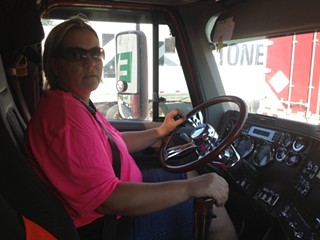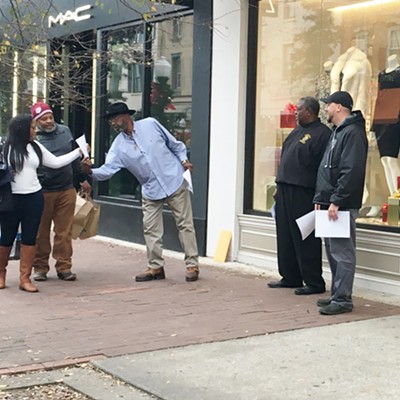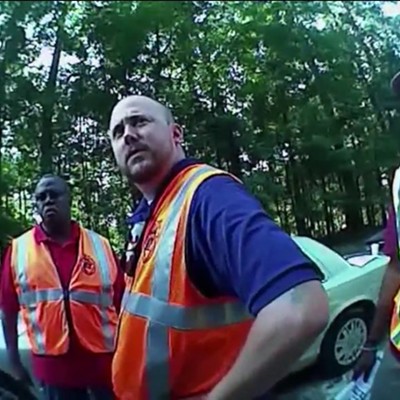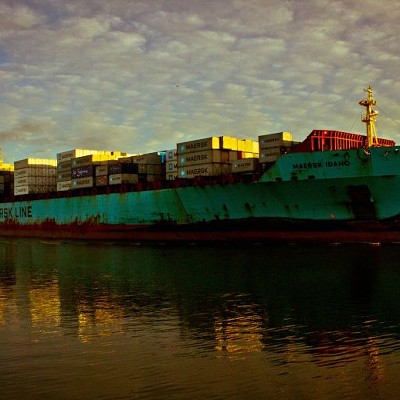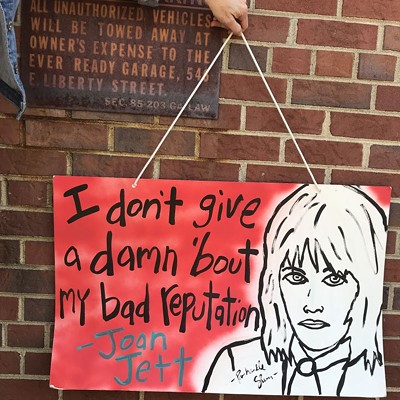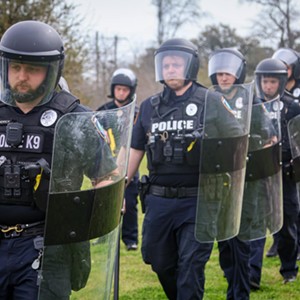Oh, how we struggle with our love/hate relationship with cheap stuff.
We knit our brows over children toiling away in faraway places like Saipan and China, but we can't help but help ourselves to six-dollar Old Navy t-shirts and 50 percent off tube socks at Sam's.
We shake our heads when we learn Wal-Mart paid Tom Cruise, Kelly Clarkson and other smiling A-list celebs top dollar to sing its praises at its shareholders' meeting last week as it repeatedly ignores employee demands for safer working environments and better wages. But then — oh look! Double roll toilet paper and 10 Taylor Swift spiral notebooks for a dollar!
Many of us live on incomes that require thrifty shopping, and even the most mindful among us must often lock our consciences in the closet with our Target towels. We put our hands over our ears and chant "lalalalala" when we hear about Honduran maquiladores forced to work for pennies making our fancy sneakers. Even the recent horrific collapse of a factory in Bangladesh that killed 1,129 workers doesn't keep us from snatching up the cute GAP shorts made by those same humans.
But would our outrage inflate if we knew the same kind of unregulated safety conditions and appallingly low compensation are happening in our own backyards?
The Port of Savannah is the fourth busiest in the country, but you already knew that. Its $16 billion-a-year industry employs hundreds of thousands, who make sure the goodies that sail into our harbor are distributed where they need to go. Some of those folks earn a decent living. A few even pilot their own Gulfstream jets.
But the port truckers — the 2,000 or so people who drive all those Faded Glory jeans and Fuji cameras and IKEA gruntals from the ships to shoppers — don't share much of the pie at all. I took a ride with port trucker Carol Cauley last week to find out more about their plight.
A single mom with a wedge haircut and wraparound sunglasses, Carol looks more like she belongs cheering on the sidelines of a soccer field than driving a big rig.
"Three points on the truck at all times," she reminds me, directing my hands and feet as I climb aboard less like Ali MacGraw in Convoy than a rejected extra from Bob the Builder.
Carol swings in the cab like the pro she is: She's been driving a truck on and off for eight years for C&G Trucking out of Chicago, one of the 150 trucking companies who do business inside the port. But in spite of her experience, she's making less and less money.
"This is definitely a hustle," she sighs, gracefully swinging the 18-wheeler down Dean Forest Road near the port gates. "Cost of gas is going up, cost of food is going up. The only thing not going up is our rates."
As an independent contractor, Carol can earn up to $78 for a round-trip run that takes her inside the port, where she picks up a shipping container, then back outside to one of several warehouses along the Savannah River. Depending on how much work there is, she can do this three or four times a day, which can take up to 16 hours as she waits in long loading lines. Surrounded by A/C and a radio, this might seem like a pretty good gig.
Except that she has an endless list of payouts: Gas (you grousing that minivan is expensive to fill? Try a 100-gallon tank times $3.50 a gallon.) Monthly truck loan payments. Vehicle maintenance and repairs. Insurance. Tires (all 18 of them!) She also has to pay for her company phone.
Carol, like other port truckers, may gross $60,000 a year but nets less than $22,000 — the poverty line for a family of four. She and most of her fellow drivers skip health insurance and dental visits. As more trucking companies come to Savannah to compete for business, management continues to undercut their fees, passing on the nickel-and-diming to their drivers.
"We're responsible for every little expense," she sighs. "We can't even afford to buy the stuff we're hauling around every day. Guys are having strokes in their trucks stressing out about it."
Here's the injustice: While the port truckers are considered "individual small business owners," the companies they drive for maintain complete control over them: They're not allowed to drive for anyone else and must clock in and out, just like employees protected under U.S. labor laws. Yet it remains awfully convenient to call them otherwise.
Ben Speight calls this an "intentional misclassification" that allows trucking companies to avoid providing basic benefits or overtime — and he intends to help Carol and her fellow truckers fix it. Speight is the organizing director of the International Brotherhood of Teamsters Local 728 and has helped establish Stand Up for Savannah, a coalition of port truckers, labor activists and Savannah citizens. Their aim is a place at the Port of Savannah feasting table with the longshoremen, the stevedores, the tugboat captains and the mechanics who are guaranteed a certain standard of living through their unions.
Yes, the truckers want a union.
That may conjure up mouthbreathers making six figures a year stapling upholstery on Chryslers, but whatever you think, unions are still the reason we get a day off and don't have to breathe asbestos at work. Don't the truckers deserve the same as their other port brethren?
"The port drivers are essentially sharecroppers on wheels," explains Speight. "They're made to sign strict contracts. They get paid by the load no matter how long they wait in line. Some have to sign lease agreements and they don't even own the trucks. If they violate a rule, they're fired.
"If that's not an employer/employee relationship, there is none."
Carol and her fellow organizers — including trucking veterans John E. Jackson, Jim Myrick and Teamster Jerome Irwin — met with Speight, local leaders and 300 other port truckers at the Coastal Georgia Center on June 1. Together they represent a lot of power: Should they ever decide to idle their engines, the port would come to a standstill.
Since the trucking industry was deregulated in 1980, port drivers everywhere have dealt with ever-worsening conditions that keep them poor, overworking and unprotected. Author and former trucker Dr. Michael Belzer explored this in his 2000 book Sweatshops on Wheels. The recent 46-page Big Rig study sponsored by the National Employment Law Project and the Change to Win Foundation documents third-world industrial abominations, including increased respiratory distress from steeping in diesel fumes all day.
Yet repeated attempts to unionize port truckers over the last 30 years have failed. In fact, the last time Savannah's container haulers met to discuss unsatisfactory conditions and compensation, the Federal Trade Commission sent out subpoenas and accused them of "anti-trust activity."
But anyone who's heard of Jimmy Hoffa knows the Teamsters aren't the submissive types. Organization efforts at the Port of Savannah parallel those in Seattle, New Jersey and especially Los Angeles, where port truckers have filed a lawsuit against Harbor Express, Inc., one of the largest trucking companies in California.
"This is an across-the-board push," says Speight. "These drivers are the invisible muscle of the port. They deserve equality and social justice. This is about fundamental human rights."
He points out that while we all love economic development, the truckers' sharecropper structure only depresses the local economy. As Gov. Nathan Deal and Atlanta mayor Kasim Reed laud the economic delights of a deeper port (with Georgia taxpayers hauling the $652 million-and-growing tab that the Obama administration has kicked to the curb), you can add port truckers to the long list of Savannahians who will see little if any benefit from the increased profits.
(Speaking of SHEP, last month in South Carolina, environmental groups settled their lawsuits against the Georgia Ports Authority and the Army Corps of Engineers in exchange for $33.5 million in protective measures for the river and surrounding wetlands — as long as the Corps can provide proof that the Speece cones slated to reoxygenate the river will actually work. There currently is no such proof, as the technology has never been used on a river system of this scale. Sure, there will be tests — after dredging has already begun in the outer harbor. Anyone else call that Insane Troll Logic?)
Dropping me off at the Circle K on her way to pick up another load of what might be tile for Home Depot or plastic water guns for Dollar General, Carol shrugs when I ask if she's afraid that she'll lose her job over speaking out about unfair working conditions.
"I'm doing this for my kids, for future generations of truckers," she says. "It's bad now, and it will only get worse. I have to take a stand."
As I pick my way through the gas station trying to avoid being flattened by a semi, I catch myself thinking about all the things I need to buy, like next year's school uniforms and one of those magic stretchy hoses for the garden and holy humid hell, some freakin' ice cube trays.
It occurs to me that Carol might have trucked any of those items. Before that, they were packed on a ship halfway around the world after being made in a cramped factory by people whose names I'll never know.
It makes them seem far more valuable than the plasticky crap they ultimately are.

